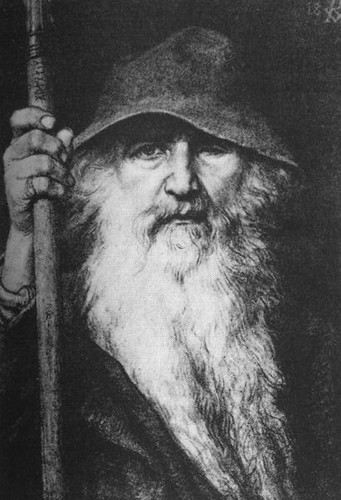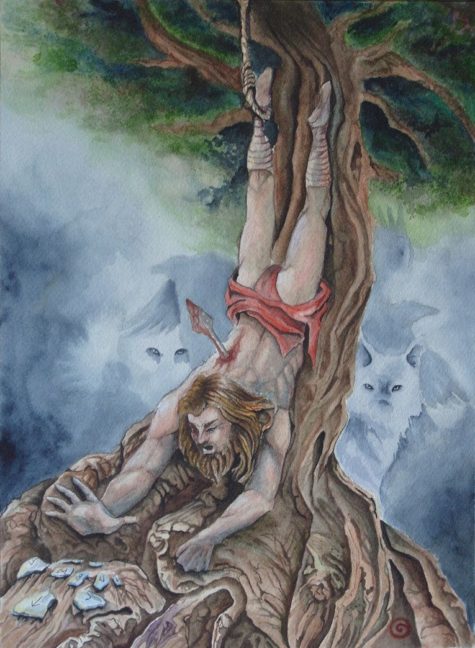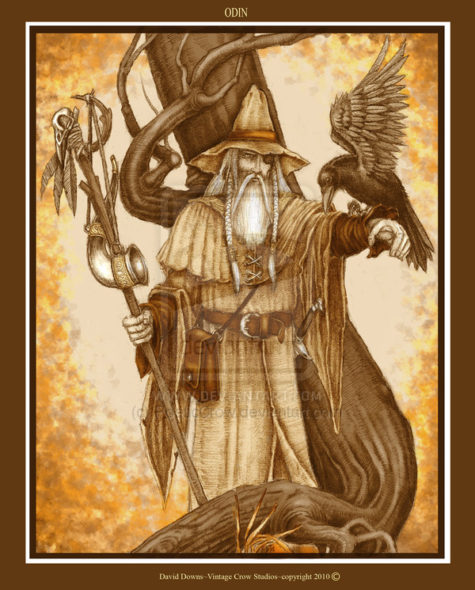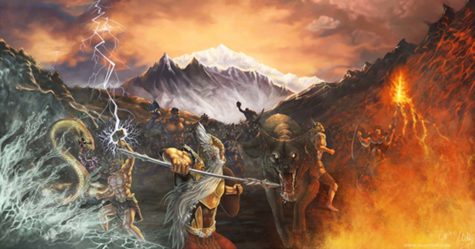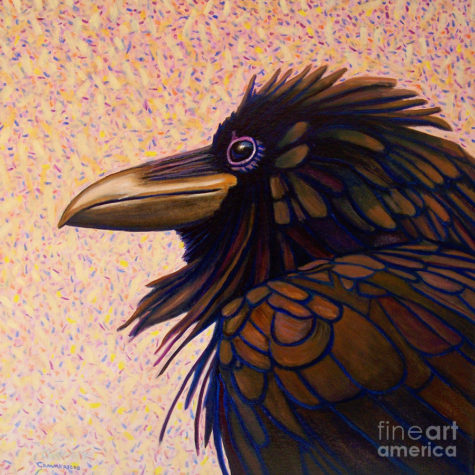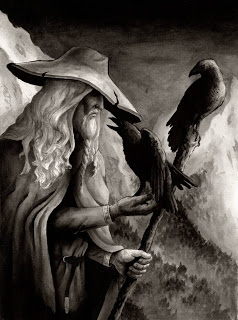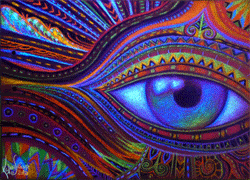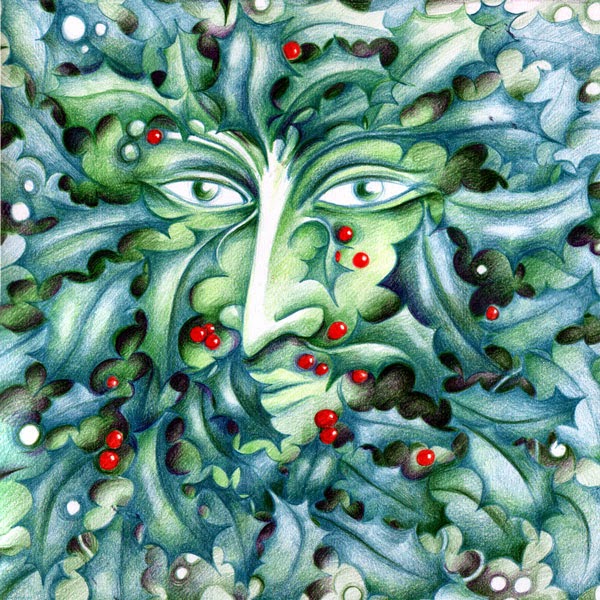Odin
An Alternative Odin Story
Odin: The Norse Biggy. Odin is Father of the Gods, King of Asgard, Ruler of the Aesir and the Lord of War, Death and Knowledge. To travel the world without being recognized, he wears a huge wide-brimmed hat. He also — thanks to Loki — rides an eight-legged horse named Sleipnir into battle. All he needs is a six-shooter and a sheriff’s badge to be able to stand in for John Wayne in True Grit.
His biggest fans include the Berserkers, which should give you some idea. He’s also very hot on Knowledge and Military Intelligence, having two ravens, Huginn and Muninn, who fly around the world every day bringing up-to-date reports.
Odin himself has only one eye, having traded the other one for a sip from Mimir’s Well of Wisdom during his visit to the great World Tree Yggdrasil. Consequently he’s full of knowledge, while his missing eye is hidden in an unknown location care of Mimir the Talking Head. The eye enabled Mimir to focus on far-distant events, allowing Odin the ability to always see far ahead.
To become the Top Wise Guy, Odin put himself through some incredibly rigorous ordeals. The Well of Wisdom lies under the second root of Yggdrasil, which allows the Dew of Knowledge to seep into it. So Odin stabbed himself with his own spear and hung himself on the tree for nine days and nights. He was then allowed a peep, and saw magic runes appear on rocks beneath him. With a superhuman effort he struggled to lift them, which must have been quite an acrobatic feat. Running his eye over the mystic symbols, he was instantly freed of all encumbrances; restored and rejuvenated with everlasting vigor enabling him to drop lightly to the ground.
His ordeal accomplished, Odin was at last able to take a well-deserved swig from Mimir’s well, making him well-wise as well as wise. It was even tastier than his usual tipple Kvas, the Mead of Inspiration, a special brew made from the blood of Kvasir. If you think a wise one-eyed Norse cowboy on an eight-legged horse would be easy to recognize, this ain’t necessarily so for Odin is a shape-changer, and his range of disguises make Sherlock Holmes look like Miss Marple. He also travels incognito under a variety of false names.
Sharing primeval God status with brothers Ve and Vili, the Great Odin helped bring the world as we know it into being, so we can forgive his little foibles. The legend tells that in the ice-laden wastes of Niflheim, he got into a rather catastrophic snowball fight with Ymir, the king of the Frost-Giants. The Abominable Snow Giant was slashed into pieces and Odin made the world from all the bits. He even found a use for the eyebrows. Odin’s dad is Bor, son of Buri, son of an ice cube. Married to Frig (with the occasional Freya fling and flirtation with Rind).
Who is Odin?
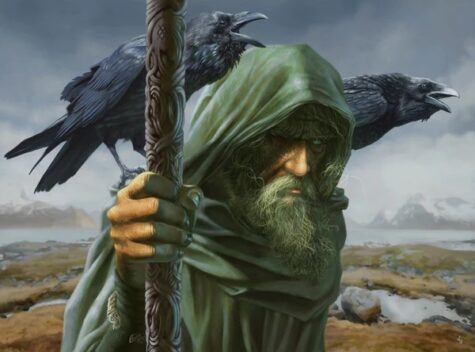
ODIN (Woden to the Anglo-Saxons) is a god of the mysterious realms of wisdom, cunning, sorcery, and death. Subtle, aristocratic, and at times inexplicable, Odin is the literal father of important gods, such as Thor, and All-Father to the whole of creation, divine and human. Amongst his gifts was the greatest of all: the gift of writing. To accomplish this Odin hung himself upside down upon the World Tree, the gigantic ash Yggdrasil ( a compound meaning “terrible horse”). After nine days of fasting and agony, in which “he made of himself a sacrifice to himself”, he “fell screaming” from the tree, having had revealed to him in a flash of insight the secret of the runes. Their initial manifestation took the form of eighteen powerful charms for protection, increase, success in battle and love-making, healing, and mastery over natural causes.
This story illustrates an important dynamic of the Northern pantheon, which did not allow for omnipotence: even Odin must pay his due. At Mimir’s well, which lay deep under the roots of Yggdrasil, the World Tree, the god had earlier chosen to undergo an important forfeit. Odin paid with one eye for a single drink of the enchanted water. His mouthful granted him wisdom and fore-sight. It is due to this sacrifice that Odin’s face is depicted with a straight line indicating an empty eye, or alternately, in a wide-brimmed hat pulled down low over the missing orb.
His quest for knowledge was never-ending. Upon his shoulders perched two ravens, Hugin (“Thought”), and Munin (“Memory”). These circled the Earth each day, seeing all, and then at night reported to Odin what they had learnt. He cherished them both, but particularly Munin, which seems to underscore the importance he placed on rune writing, record keeping, and honouring the heroic deeds of the past.
There is another bird associated with Odin, the eagle. The god often transformed himself into this canny raptor, both to view the workings of the world and to intervene when an avian form was better suited to his ends.
Odin’s fabulous grey horse Sleipnir (“Slippery One”) was like no other. This eight-legged horse was the offspring of a giant’s magical stallion and the “trickster” god, Loki, who disguised himself as an alluring mare to distract the stallion from the task of building a wall around Asgard, home of the Gods. If the wall had been completed by a certain date, Freyja, the goddess of beauty, war and sexuality would have been forfeit to the giant as payment for his labours. (The gods also stood to lose the Sun and the Moon, but did not seem particularly concerned about their impending loss!)
Loki was successful, but vanished for a few seasons as he had to bear the fruit of his trickery. He returned to Odin leading his equine offspring, which he presented as a gift. With his eight legs, Sleipnir could run twice as fast as ordinary steeds, and it is he who carries the valiant dead from the battle field to Valhalla.
In this realm warriors fought all day yet never died from their wounds, were made whole again in time for supper, at which they feasted upon the flesh of a similarly eternal magical boar who was born anew each day. Intoxicating mead filled their drinking horns, and the many-room hall rang with the song of the victorious rewarded there. Not a bad end for a pragmatic folk who lived and died by their iron.
For an alternative look at Odin, check out this post.
Odin’s Rune Song
Rúnatal or Óðins Rune Song, Rúnatáls-þáttr-Óðins (stanzas 139-146) is a section of the Hávamál where Odin reveals the origins of the runes. In stanzas 139 and 140, Odin describes his sacrifice of himself to himself:
138.
I wot that I hung on the wind-tossed tree
all of nights nine,
wounded by spear, bespoken to Óthin,
bespoken myself to myself,
[upon that tree of which none telleth
from what roots it doth rise]
139.
Neither horn they upheld nor handed me bread;
I looked below me–
aloud I cried–
caught up the runes, caught them up wailing,
thence to the ground fell again.
140.
From the son of Bolthorn, Bestla’s father,
I mastered mighty songs nine,
and a drink I had, of the dearest mead,
got from out of Óthrærir.
141.
Then began I to grow and gain in insight,
to wax eke in wisdom:
One verse led on to another verse,
one poem led on to the other poem.
142.
Runes wilt thou find, and rightly read,
of wondrous weight,
of mighty magic,
which that dyed the dread God,
which that made the holy hosts,
and were etched by Óthin.
143.
Óthin among Æsir, for alfs, Dain,
Dvalin for the dwarfs,
Alsvith among etins, (but for earth-borne men)
wrought I some myself.
144.
Know’st how to write, know’st how to read,
know’st how to stain, how to understand,
know’st how to ask, know’st how to offer,
know’st how to supplicate, know’st how to sacrifice?
145.
‘Tis better unasked than offered overmuch;
for ay doth a gift look for gain;
’tis better unasked than offered overmuch:
thus did Óthin write ere the earth began,
when up he rose in after time.
146.
Those spells I know which the spouses of kings
wot not, nor earthly wight:
“Help” one is hight, with which holpen thou’lt be
in sorrow and care and sickness.
147.
That other I know which all will need
who leeches list to be:
(on the bark scratch them of bole in the woods
whose boughs bend to the east).
148.
That third I know, if my need be great
to fetter a foeman fell:
I can dull the swords of deadly foes,
that nor wiles nor weapons avail.
149
that fourth I know, if foemen have
fettered me hand and foot:
I chant a charm the chains to break,
so the fetters fly off my feet,
and off my hands the halter.
150.
That fifth I know, if from foemans’s hand
I see a spear sped into throng,
never so fast it flies but its flight I can stay,
once my eye lights on it.
151.
That sixth I know, if me someone wounds
with runes on gnarled root written,
or rouses my wrath by reckless speech:
him blights shall blast, not me.
152.
That seventh I know, if o’er sleepers’ heads
I behold a hall on fire:
however bright the blaze I can beat it down–
that mighty spell I can speak.
153.
That eighth I know which to all men is
needful, and good to know:
when hatred runs high, heroes among,
their strife I can settle full soon.
154.
That ninth I know: if need there be
to guard a ship in a gale,
the wind I can calm, and the waves also,
and wholly soothe the sea.
155.
That tenth I know, if night-hags sporting
I scan aloft in the sky:
I scare them with spells so they scatter abroad,
heedless of their hides,
heedless of their haunts.
156.
That eleventh I know, if I am to lead
old friends to the fray:
under buckler I chant that briskly they fare
hale and whole to battle,
hale and whole from battle:
hale where ever they are.
157.
That twelfth I know, if on tree I see
a hanged one hoisted on high:
thus I write and the runes I stain
that down he drops
and tells me his tale.
158.
That thirteenth I know if a thane’s son I shall
wet with holy water:
never will he fall, though the fray be hot,
nor sink down, wounded by sword.
159.
That fourteenth I know, if to folk I shall
sing and say of the Gods:
Æsir and alfs know I altogether–
of unlearned few have that lore.
160.
That know I fifteenth which Thjóthrærir sang,
the dwarf, before Delling’s door:
gave to Æsir strength, to alfs victory
by his song, and insight to Othin.
161.
That sixteenth I know, if I seek me some maid,
to work my will with her:
the white-armed woman’s heart I bewitch,
and toward me I turn her thoughts.
162.
That seventeenth I know, (if the slender maid’s love
I have, and hold her to me:
this I sing to her) that she hardly will
leave me for other man’s love.
163.
In this lore wilt thou, Loddfáfnir, be
unversed forever and ay:
thy weal were it, if this wisdom thine–
’tis helpful, if heeded,
’tis needful, if known.
164.
That eighteenth I know which to none I will tell,
neither maid nor man’s wife–
’tis best warded if but one know it:
this speak I last of my spells–
but only to her in whose arms I lie,
or else to my sister also.
165.
Now are Hár’s sayings spoken in Hár’s hall,
of help to the sons of men,
of harm to the sons of etins;
hail to whoever spoke them, hail to whoever knows them!
Gain they who grasp them,
happy they who heed them!
The Havamàl
The Havamàl is part of the Elder or “Poetic” Edda, which is one of the primary written sources for Norse mythology. This excerpt from the W. H. Auden and P. B. Taylor translation of the Havamàl contains Odin’s telling of how he obtained the runes and runic power.
Wounded I hung on a wind-swept gallows
For nine long nights,
Pierced by a spear, pledged to Odin,
Offered, myself to myself
The wisest know not from whence spring
The roots of that ancient rood.
They gave me no bread,
They gave me no mead,
I looked down;
With a loud cry
I took up runes;
From that tree I fell.
Nine lays of power
I learned from the famous Bolthor, Bestla’ s father:
He poured me a draught of precious mead,
Mixed with magic Odrerir.
Waxed and throve well;
Word from word gave words to me,
Deed from deed gave deeds to me.
Runes you will find, and readable staves,
Very strong staves,
Very stout staves,
Staves that Bolthor stained,
Made by mighty powers,
Graven by the prophetic God.
For the Gods by Odin, for the Elves by Dain,
By Dvalin, too, for the Dwarves,
By Asvid for the hateful Giants,
And some I carved myself:
Thund, before man was made, scratched them,
Who rose first, fell thereafter.
Know how to cut them,
know how to read them,
Know how to stain them,
know how to prove them,
Know how to evoke them,
know how to score them,
Know how to send them,
know how to send them.
Better not to ask than to over-pledge
As a gift that demands a gift.
Better not to send
Than to slay too many.
Norse Mythology ~ Simplified
Creation
In the beginning was Muspell, the realm of fire. It is a place of dreadful light and heat. Only its natives, the Fire Giants, can tolerate its flames. Surt, a Fire Giant, guards Muspell’s border, armed with a flaming sword. At the end of the era, at Ragnarok, Surt and his companions will destroy all the Gods and and their world with fire.
Outside of Muspell lies the void called Ginnungagap, and north of Ginnungagap is Niflheim, the world of awesome dark and cold. In this world are eleven rivers flowing from a great well. The rivers are frozen and occupy Ginnungagap. When the wind, rain, ice, and cold meet the heat and fire of Muspell in the center of Ginnungagap, a place of light, air, and warmth is born.
Where fire and ice first met, thawing drops appeared. Beneath the melting ice lay a Frost Giant named Ymir. Ymir slept, falling into a sweat. Under his left arm there grew a couple, male and female Giants. One of his legs begot a son with the other.
The melting frost became a cow called Audhumla from whose udders ran four rivers of milk that fed Ymir.
After one day of licking salty ice blocks, she freed a man’s hair from the ice. After two days, his head appeared. On the third day the whole man was released from the ice. The man’s name was Buri. Buri had a son named Bor. Bor married Bestla, the daughter of a Giant, with whom he had three sons. Odin was the first, Vili the second, and Vé the third. Odin, in association with his brothers, is the ruler of heaven and earth. He is the greatest and most famous of all Gods.
Odin and his brothers killed the Giant Ymir. They carried Ymir to the middle of Ginnungagap and created the world, called Midgard, from his body. Ymir’s blood became the sea and and lakes. His skull became the cover of the sky which was set over the earth. Ymir’s brains were tossed into the air, and became clouds. Then sparks and burning embers from Muspell were placed in the middle of Ginnungagap to give light to Midgard. They named the stars and set their paths. Ymir’s skeleton became the mountains of Midgard. His teeth and jaws became rocks and pebbles. His flesh was ground into dirt in the great mill Grottekvarnen. Ymir’s hair became trees. Maggots appeared in Ymir’s flesh became Dwarves, who had human understanding and the appearance of men, but lived in the earth. Under each corner of the sky the suns of Buri put a Dwarf. The four Dwarves are called Austri (East), Vestri (West), Nordri (North), and Sudri (South).
Midgard
Midgard was surrounded by an enormous ocean. Odin, Vili and Vé gave lands along the coasts to the friendlier Giants, the Etin, for their settlements. From two trees they created a human man and woman. Odin gave the man and the woman spirit and life. Vili gave them understanding and the power of movement. Vé gave them clothing and names. The man was named Ask [Ash] and the woman Embla [Elm]. Ask and Embla are the ancestors of all humans in Midgard.
Asgard
Next they built Åsgard, the home of the Gods. In a hall named Hlidskjálf, Odin sits on a high seat from which he can look out over the whole world. Odin married Frigga, the daughter of the Giant Fjörgvin.
Yggdrasil
Yggdrasil, the World-Tree, the tree of fate, arises in the center of the Midgard. Its branches reach up over Asgard. The entire universe is dependent on the World-Tree. The tree has three three roots. One reaches into the underworld Hel, another to the world of the Frost-Giants, and the last one to the world of human beings. Beneath the tree is the Urda well, guarded by the Norns, the three Goddesses of Fate. Two other wells also feed Yggdrasil. One is called Hvergelmer, and the other is Mimer’s well. The dragon Nidhog lies in Hvergelmer and gnaws on the roots of the tree. Mimer’s well is the well of wisdom, guarded by the wisest of all beings, Mimer. Odin once gave his right eye for a drink of the water from this well.
Bifrost
The Gods built a bridge called Bifröst from Asgard (heaven) to Midgard (earth). They ride daily over the great rainbow bridge. Bifröst is guarded by the God Heimdall. Heimdall sleeps lighter than a bird, sees one hundred travel-days in each direction, and has such sharp ears that he can hear the grass and the wool grow. But as strong as Bifröst is, it will collapse when the when the Frost Giants ride out over it at Ragnarok. There is nothing that can be relied on when the sons of Muspell are on the warpath.
Gods & Goddeses
The Norse deities are divided into two major groups, the Aesir and the Vanir. The Vanir, the “Earth Gods”, symbolize riches, fertility, and fecundity. They are associated with the earth and the sea. The most important Gods of the Vanir are Njord, Freyr, Aegir and Freya.
The Aesir, the “Sky Gods”, symbolize power, wisdom, and war. They are long lived, but not immortal. Odin is the leader of the Gods, with magical skills. Thor, with his magic hammer, is the God of Thunder who presides over working men. Loki is a Giant who is an Aesir by adoption. He and Odin made a vow of friendship and became blood-brothers. Loki is a trickster, a shapeshifter, and a troublemaker.
In the distant past a fierce war was fought between the Aesir and the Vanir. The conflict between the Gods began when Odin and Thor refused to recognize the full status of Godhood to the Vanir. The Vanir sent a beautiful woman, Gullveig (gold-drink), to the Aesir, who tried to destroy her. She came back to life three times, and led to their corruption. War then broke out. After both sides were exhausted, each side exchanged members of its group with the other; the Vanir sent Njord and his son and daughter Freyr and Freya, the Aesir sent Mimir and Hoenir. The truce was celebrated by a meeting at which all the Gods spit into a bowl, creating a Giant called Kvasir, who is the sign of peace and harmony among the deities. Kvasir was later sacrificed and from his blood became a potent drink which inebriates deities and gives inspiration to poets.
Balder, one of the sons of Odin, appeared as the essence of intelligence, piety, and wisdom. Both Gods and men came to him to settle legal disputes, and his judgments were reconciling and fair. Balder had a dream in which his life was threatened. Upon reporting this dream to his mother, Frigga, she exacted an oath from fire, water, metals, earth, stones, and all birds and animals. They swore they would not harm Balder. Because of his immunity, the Aesir used Balder as a target in games, throwing darts and stones at him. When Loki saw this, he disguised himself as a woman and asked Frigga why Balder suffered no harm. Frigga told him of the oath. Loki tricked her into telling him that mistletoe was the only being that did not agree to the oath. Loki immediately took mistletoe and created arrows. He took the arrows to the Blind God Hoder, brother of Balder, and volunteered to direct his aim so that he would participate in the game. When the mistletoe struck Balder, Balder fell dead.
Because Balder was not a warrior and did not die in battle, he did not go to Valhalla, the hall of slain heroes, but into the domain of Hel, Keeper of the Dead. When Odin begged his release, Hel (Loki’s daughter) responded that if everything in the world both dead and alive wept for Balder, then he could return to the Aesir. If not, he would remain with Hel. The Aesir sent messengers throughout the world asking all to weep for Balder. All responded except a Giantess, Thokk (Loki in disguise), whose refusal to weep forced Balder to remain in Hel’s domain. The Aesir succeeded in capturing Loki. To punish him for his many crimes, they chained him beneath a serpent, which dripped venom onto him, causing terrible pain.
Ragnarok
The Ragnarok, or end of the world, has been prophesied. When Mirmir no longer guards his well, Yggdrasil’s root will begin to rot. The Nidhog dragon will finally succeed in knawing through the root that ends at Hvergelmer well. The Norns will be alarmed at the pollution of the Urdh well and the yellowing of the leaves of the world tree. Odin’s sacrificed eye lies in Mirmir’s well and sees what is to come. He knows that nothing can stop Fibulwinter, three years with endless winter, which will be followed by Ragnarok.
The days will grow colder until even Urda well freezes solid. Storm and sleet will pound the World-Tree. One of Yggdrasil’s branches will break and fall, striking Jormungand, the world serpent, which immediately will let go of its tail. The Hel ship Naglfar will become visible in the mist. The wolves Skoll and Manegarm will get closer and closer to Sun and Moon, which they have chased for eons. Fenrir wolf and and the Hel-wolf Garm will break their chains. Giants will release Loki from his fetters on the mountain. Nidhoggr will leave the roots of Yggdrasil and head toward Asgard. Behind him will march all the Giants. Heimdall will see all this, and will take up the Gjallarhorn to blow the warning.
Loki will lead monsters and Giants to attack the Gods in the great battle of Ragnarok on Vigrid plain. The leader of the Fire Giants, Surt, will attack Freyr, who will be armed only with a deer’s antler. Freyr will stick his deer horn through Surt’s eye, but then Surt will kill him with his flaming sword. Thor’s son Magni will send a killing arrow toward Nidhoggr’s head. Side by side, Odin and Thor will fight Fenrir and Jormungand. Odin will put his spear, Gungnir, in Fenrir’s chest, but the wolf will crush Odin to the ground. Thor will kill Jormungand with his hammer, Mjollnir, but then will take nine steps backwards and fall down, poisoned by the serpent’s venom. Tyr will kill the wolf dog Garm. Vidar will take revenge for Odin. The enemies Loki and Heimdall will their spears at each other at the same time and both will die. Modi will be surrounded by Giants, but Magni and Vidar will rescue him.
The winds will increase and blow Yggdrasil from every direction until the great World-Tree falls. The Dark Elves forge will tip and the World-Tree will burn. The Bifrost Rainbow Bridge will collapse and one by one each of the Worlds will fall. The remaining Aesir will escape in Freyr’s ship, Skidbladnir. It will be almost taken by the Hel-ship Naglfar. Midgard will then be destroyed by fire, and will sink back into the sea.
This final destruction will be followed by a rebirth, the Earth reemerging from the sea. Seven sons of the dead Aesir will return to Asgard and rule the universe.
From: Sunnyway
I wish…
The Doom of Odin
“I find no comfort in the shade
Under the branch of the Great Ash.
I remember the mist
of our ancient past.
As I speak to you in the present,
My ancient eyes
see the terrible future.
“Do you not see what I see?
Do you not hear
death approaching?
“The mournful cry of Giallr-horn
shall shatter the peace
And shake the foundation of heaven.
“Raise up your banner
And gather your noble company
from your great hall,
Father of the Slains.
For you shall go to your destiny.
“No knowledge can save you,
And no magic will save you.
For you will end up in Fenrir’s belly,
While heaven and earth will burn
in Surt’s unholy fire.”
— Doom of Odin,
from the Book of Heroes
James Cheney: Invocation To The Dark Mother
Daniel: Prayer Before The Final Battle
blessed obyno: Queen of Ghosts
blessed obyno: Queen of Ghosts
Caerlion Arthur: The Great, Bloody and Bruised Veil of the World
